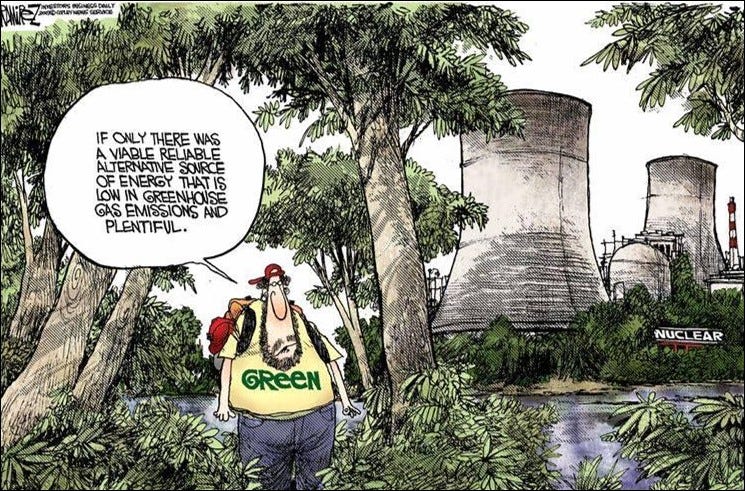A warm welcome to our new subscribers. If you aren’t yet subscribed, the link below will help solve that problem. 👇
This past week, I’ve been focused on learning more about nuclear energy.
My rationale was twofold:
I’ve noticed the growing support for nuclear energy amongst both policymakers and leaders in the energy space.
My understanding of nuclear energy was previously rooted in pop culture.
.
Here is a summary of the most interesting things I learned.
Winds of Nuclear Change ☢️
There are at least two recent examples of high-profile public figures advocating for nuclear energy.
The first was U.S. Secretary of Planet1 John Kerry, who announced at a press conference earlier this year that he’s reversed his stance on nuclear energy.
On the topic, he said, “go for it, no other alternatives, zero emissions.”
Secondly, three weeks ago, Tesla’s CEO Elon Musk spoke out in defense of nuclear energy, calling it “extremely safe.”
It’s worth clarifying that both Kerry and Musk are referring to nuclear fission, a technology that has been around since the 1950s. Cracking the code to nuclear fusion remains a work in progress.
This one-minute video from the Department of Energy provides a helpful introduction to the difference between fusion and fission if you care to learn more.
If you’re enjoying the Plug, please consider sharing it with your friends and coworkers. I would really appreciate your help in growing our distribution! 🙂
What Nuclear & Net-Zero Have in Common 🍻
I believe the main reason behind the ongoing nuclear energy renaissance has to do with carbon emissions2. Or rather, nuclear energy’s lack of emissions.
A 2014 report published by the IPCC3 highlighted that nuclear energy may actually generate fewer life-cycle emissions than renewables, including solar, hydro and geothermal.
Hmm… Interesting.
If this is true, it begs the question - why is everyone so focused on renewables?
The chart above was shared on the website of Michael Shellenberger’s non-profit Environmental Progress. Shellenberger has been a devout environmentalist throughout his career.
Back in 2017, at a TedTalk in Berlin, he laid out his pro-nuclear case.
In summary - he believes there’s a widespread public misunderstanding of nuclear energy.
He argues persuasively that nuclear energy is a lot safer, a lot cleaner, and a lot more important to reducing global emissions than most people think.
Duly noted, Michael!
Pop Culture References Aren’t Helping 🎥
I’ve been trying to understand why we’re all so scared of nuclear energy. Ironically, I think pop culture has been a contributing factor.
Take “The Simpsons” as an example.
Nuclear energy references are scattered throughout the show’s 33 seasons.
Might it be possible that “The Simpsons” have negatively influenced public perception of nuclear energy?
The U.S. Department of Energy sure seems to think so, after publishing a 2018 blog post titled “7 Things the Simpsons Got Wrong About Nuclear.”
Most recently, HBO’s 2019 mini-series Chernobyl dramatized the aftermath of the 1986 nuclear fire, which took place in the former Soviet Union.
Could it be that our subconscious fear of nuclear energy stems from the cartoons and drama series we’ve watched?
This would help to explain why we’re all so terrified of nuclear.
Scared to Death 💀
Prior to last week, one of my biggest fears around nuclear energy was the fatality of nuclear accidents4. The 1986 nuclear accident in Chernobyl, for example, has been described as the “worst man-made accident in history.”
But I was surprised to learn from a 2005 United Nations report that “fewer than 50 deaths had been directly attributed to radiation from the [Chernobyl] disaster.”
My point is not to downplay the loss of life resulting from nuclear mishaps.
Instead, it’s to point out that we are more likely to die while driving our cars, or going out for a walk than we are from malfunctioning nuclear reactors.

In 2011, an earthquake off the coast of Japan knock out the power supply to three nuclear reactors in Fukushima. The incident once again sparked global concern around the safety of nuclear energy.
But, like Chernobyl, I was surprised by the resulting loss of life.

Ten years after the incident, there remains one single death attributable to Fukushima’s radiation. On the other hand, Japan’s fear of nuclear energy led to the chaotic evacuation of ~60,000 residents.
As a 2018 Financial Times article stated:
“It is becoming increasingly clear, say experts, that the evacuation, not the nuclear accident itself, was the most devastating part of the disaster.”
In Summary 🔌
Sometimes, the right answer is the one we’ve already discarded.
As the world continues to push for emissions reduction, could nuclear energy be the right answer?

If you want to learn more about nuclear energy, here are two other resources I found helpful:
Article: The Activists Who Embrace Nuclear Power (The New Yorker)
Slide Deck: The Complete Case for Nuclear (Environmental Progress)
That isn’t actually John Kerry’s official title, I just made that up. His real title is “United States Special Presidential Envoy for Climate,” which is a mouthful.
The main objective set out in the 2015 Paris Agreement was to reduce global emissions, in order to limit temperature rise to 1.5⁰C relative to the pre-industrial era.
The Intergovernmental Panel on Climate Change (IPCC) is the same organization that earlier this week released a climate assessment with the title “Climate change widespread, rapid, and intensifying.”
Admittedly, this may have been the result of binge-watching Chernobyl





